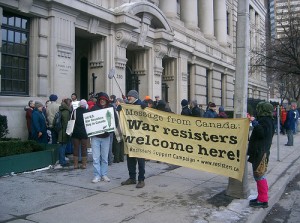Canada: American Military Deserters Not Welcome
 If you’ve volunteered for service in the U.S. Armed Forces but don’t actually want to go to war, don’t count on hiding in Canada.
If you’ve volunteered for service in the U.S. Armed Forces but don’t actually want to go to war, don’t count on hiding in Canada.
The Canadian government’s effort to remove [U.S. Army deserter James Corey] Glass contrasts with the warm reception given to deserters and draft avoiders from the United States during the war in Vietnam. And although the war in Iraq has very little support among Canadians, the situation of Mr. Glass and others who abandoned their military positions provokes a wide range of responses. For American soldiers seeking an escape, Canada is no longer a guaranteed haven.
[…]
During the Vietnam War, the Liberal prime minister, Pierre Elliott Trudeau, welcomed American deserters and draft dodgers, declaring that Canada “should be a refuge from militarism.” Americans who arrived were generally able to obtain legal immigrant status simply by applying at the border, or even after they entered Canada.
[…]
Changes to immigration laws have made it far more difficult for deserters to remain in Canada. Deserters wanting at least temporary legal status must be declared refugees. But refugees in Canada must show that they have, as the government puts it, a “well-founded fear of being persecuted” for religious, racial or political reasons. Alternately, refugees may demonstrate that for them to be returned to their home country would put their lives at risk, or would subject them to torture or “cruel and unusual treatment or punishment.”
The piece notes that the scale is much different, with an estimated 20,000 Americans fleeing to Canada to escape service in Vietnam compared to “no more than 200” during the present conflict. Another big difference, albeit a related one, is that the former were mostly civilians escaping forced military service during the era of conscription. Every single person subject to fighting in Iraq, by contrast, volunteered for military duty. That’s a huge difference.
Story: Small Wars Journal. Photo: photopia/HiMY SYeD via Kerfuffles and Flourishes
I think the main difference is that our guys are volunteers. And there isn’t anyone who has enlisted in the last 7 years that isn’t aware there is a war on.
I suspect if the US still had the draft that Canada may have a different view on whether or not they can stay.
a higher court in canada has agreed to hear at least one of these cases.
The situation is very different today then when there was a draft. If you are not prepared to fight, don’t join. I have no sympathy for someone who enlists, takes the benefits, then decides they do not want to see combat…
I have no sympathy for someone who enlists, takes the benefits, then decides they do not want to see combat…
I agree.
I remember when the first Gulf war occurred there were people who said things along the lines of “I just joined the army to pay for school, I didn’t join it to fight a war.”
And it isn’t that I don’t see where they are coming from at all-the army-especially the peace time army often billed itself as a way to get an education and specialized training. But there isn’t anyone in the US military right now that didn’t enlist or reenlist during a time of war. Having to be deployed and fight in a war at this point is pretty much a “going to happen.”
It’s interesting to note that one of the larger complaints I hear on the Canaidna talkers about such people are not unlike that of those pouring over our southern border… they’re not paying into the healthcare system, etc.
Since a bit over half of the Canadian stations I can get here on the south shore are inside the left-leaning province of Ontario, it strikes me as particularly interesting.